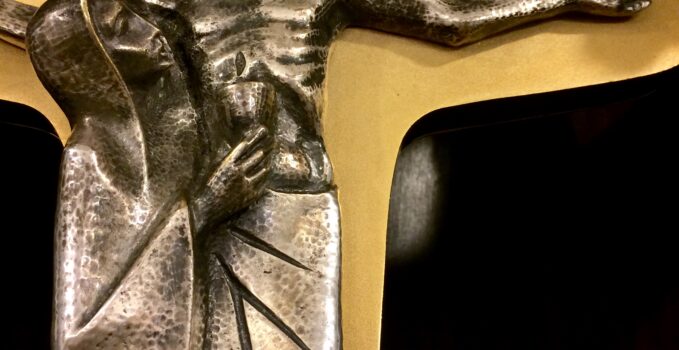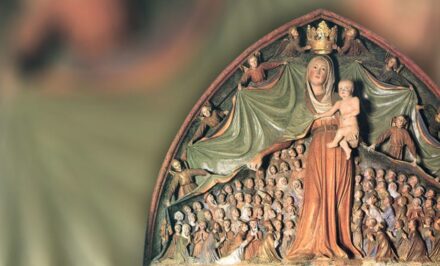Elke Karmann, Germany •
When I read your article “I want everything …”, I thought: How beautiful that someone is writing what is also burning on the nails of many of us Schoenstatters. I, too, have followed with interest the German Synodal Way and the documents prepared for it, especially with regard to women, and I was able to follow most of the discussions and votes of the third plenary assembly of the Synodal Way – thanks to the Internet. As a Schoenstatter, I was especially pleased that Bishop Gerber (a member of the Institute of Schoenstatt Diocesan Priests) is in Synodal Forum 3 “Women in Ministries and Offices in the Church” and can also contribute Schoenstatt thinking there. —
Fraternal togetherness, as the synodal way strives for, we have received as a spiritual inheritance and mission from our Founder. I was able to experience this fraternal, appreciative togetherness and the constructive cooperation at eye level in the togetherness of the different branches and also very beautifully in the cooperation of Schoenstatt priests and lay people and beyond that in the process of togetherness of the spiritual communities (Together for Europe).
My personal experience
I have decided to share from my life why this topic touches me so much: As a child, I was allowed to go to early communion when I was barely 4 years old, and I wanted to become an altar server and a priest at an early age. My love for Jesus was very great, and I wanted to make God’s love tangible to many people. I thought it was unfair that this path was only open to boys – and I then preferred to be a boy.
But at some point, I accepted that this longing in me to become a pastor could not be fulfilled.
Involved in the parish as a child
In the parish I took on co-responsibility at an early age – inspired by my experiences at the family meetings in Schoenstatt. At the age of 9, I was entrusted with the musical organization of the school masses with modern children’s and youth songs. At the age of 11, the parish priest appointed me as group leader for 20 children between the ages of 9-10. There, too, I found help and support in the Schoenstatt Girls’ Youth. In this way I grew more and more deeply into Schoenstatt and also into the parish community with the tasks that were given to me.
… and I forgot my childhood wish
In the Schoenstatt Girls’ Youth, we heard a lecture in the leadership circle (at that time called the Schwarzhorn Group) about the priesthood and why it could not be opened to us women. The action of Jesus in the Lord’s Supper, the representation of Christ by a man, and the eschatological reasons presented then helped me to accept why the ministries and offices in the Church are not open to us women. I then also forgot my original desire and contributed in different ways and tasks in the Church and in Schoenstatt.
Then came the Synodal Way, Mary 2.0 and Katharina Ganz
Through my involvement with the Synodal Way and also with “Mary 2.0”, I came back into contact with the subject of “women and their vocations in the Church”. But only through the exchange with an acquaintance and especially through reading her book “Women disturb – and without them church has no future” (by Katharina Ganz) I became aware again of my longing from my childhood days.
Convinced that God’s spirit is also at work in the spirit of the times
As long as women are not included in all the important life processes of the church, the church breathes with only one lung, as it were, because it does not use the charisms that lie within it. The church cannot unfold its full radiance and will fail in the long run. We can only remain credible as Christians if we are not afraid of change and are faithfully convinced that God’s Spirit is at work even in the spirit of the times.
This is how Father Kentenich taught us “to have our ear on the heart of God and our hand on the pulse of the times.” Not everything that is tradition is also worthy of being handed down in the respective time. After all, for a long time, for example, all vernacular translations of the Holy Scriptures were on the index of the Catholic Church. “Whoever read a book that was on the “blacklist” was subject to the penalty of excommunication and thus risked his eternal salvation,” explains Hubert Wolf, professor of church history, in his book “Index – der Vatikan und die verbotenen Bücher” (p.7f). Today we only laugh about it and cannot understand that even “Knigge”, “Onkel Toms Hütte” and works of Karl May were on the blacklist, and even in 1954 Immanuel Kant with “Kritik der reinen Vernunft” was still on the blacklist.
Or let’s just think about the dark chapter of cultural genocide, which was committed for decades by re-education schools on the children of the Canadian First Nations (and not only there) in the (hopefully) good faith to proselytize the “savages”, to drive out their “heathen and devilish” culture with completely degrading methods and to Christianize them. Only in the 1990-ies the last Catholic forced schools were closed also in Canada. In 2022, we can hardly imagine that this sky-scraping injustice – contrary to all scientific knowledge available for decades and the prevailing common sense about human dignity – only came to an end in 1990 and was maintained for so long by Church and society in Canada.
As Church, according to Lumen Gentium, we are a constantly pilgrim people of God, always on the way, always called to renew ourselves. As a Schoenstatt Movement, we seek to recognize the God of life through his traces in the voices of each time and soul.
Restoring a climate of hope of trust
Yes, it is worthwhile as a Schoenstatt Movement and as individuals to support Pope Francis in his process of renewal of the Church and to look with him at which old braids may quietly be cut off with the passage of time and how Christ envisions a Church that in the 21st century, according to his desire, “can do much to restore a climate of hope and trust, as a sign of a new departure whose urgency we all feel” (Letter for the Jubilee 2025).
I commit myself…
I see a first but important step in which we can all participate in the Frankfurt Declaration, which emerged after the 3rd Plenary Assembly of the Synodal Way and which was signed by many synod members, including the President of the German Bishops’ Conference, Georg Bätzing. We are all invited to join this declaration by signing it. Unlike other petitions, it contains a self-commitment. I find this particularly sympathetic and convincing. It is not enough to just wait for others to do something. I am asked to join by my signature and at the same time I commit myself to live synodal church through fraternal, appreciative togetherness, when the declaration states:
“We perceive the spirit of synodal deliberations and decisions as an inspiration to find new ways to bring the God of life close to the people of our time.
Therefore, we commit ourselves to be resolute advocates for a church that lives synodality in the places where God places us.”
Original: German,16.02.2022. Translation: Maria Fischer @schoenstatt.org














